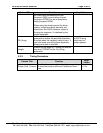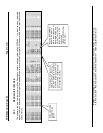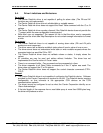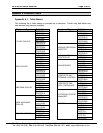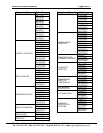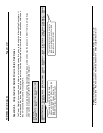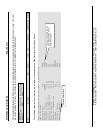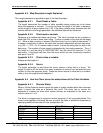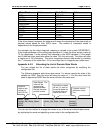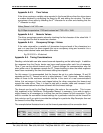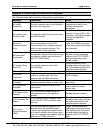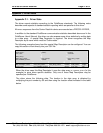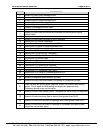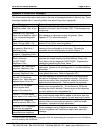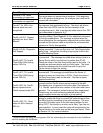
FS
-
8700
-
82 Carrier DataLink
Page
25
of
31
FieldServer Technologies 1991 Tarob Court Milpitas, California 95035 USA Web:www.fieldserver.com
Tel: (408) 262-2299 Fax: (408) 262-9042 Toll_Free: 888-509-1970 email: support@fieldserver.com
Appendix A.4.3. Time Values
If the driver receives a variable value reported in the format hh:mm then the driver stores
a number obtained by multiplying the hours by 60 and adding the minutes. The driver
recognizes a time value by checking the 3
rd
character for a colon and checking that the
1
st
character is a digit.
Value_Stored = hh * 60 + mm
Eg. 5:30pm is reported as 17:20 and is stored as 17*60 + 20 = 1040.
Appendix A.4.4. Numeric Values
The driver recognizes numeric values by checking the first character of the value field. If
it is a digit then the field is treated as a number.
Appendix A.4.5. Occupancy Strings / Values
If the value returned for a variable is 8 characters long and each of the characters is a
one or a zero then the driver regards this as an occupancy string and converts it to a
binary coded decimal value and stores this value.
Eg: 00101010 = 42 decimal
Appendix A.5. Timing Considerations
Reading a whole table can take several seconds depending on the table length. In addition
the response from the Carrier device can have small pauses after each line of response.
Thus, if you use the default timeout and IC_Timeout settings the communications may fail
when either one of the pauses exceeds the IC_Timeout setting or when the whole response
hasn’t been received by the time the timeout setting has elapsed.
For this reason it is recommended that the timeout be set to a value between 15 and 30
seconds and the IC_Timeout be set to a value between 7 and 15 seconds. Before setting
either of these to the maximum consider that the in the event of a real communications
failure, this set amount of time must elapse before the driver recognizes the timeout and
reports the node offline. Thus, it is best to start with a smaller value and increase it until
reliable communications have been achieved with the timeout settings.
The timeout can be set for the Map Descriptor, the node or the connection. This is more
fully explained in the FieldServer Configuration Manual. In summary, if you wish to apply a
single timeout to all messages to a device then set the timeout for the connection. If you
wish to override the connection timeout settings for a particular node the set the timeout for
that node too and if you wish to override the settings for a particular Map Descriptor then set
the timeout for that Map Descriptor.
The example below illustrates how to set the timeout parameters at the connection level.
// Client Side Connections
Connections
Port, Baud, Parity, Data_bits, Stop_Bits, Protocol , Handshaking, Poll_Delay, Timeou,t, IC_Timeout
P8, 9600, None, 8 , 1 , CarrierDL, None , 0.100s , 30.0s , 15.0s



